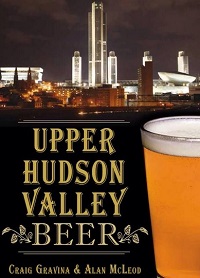 This is a pretty interesting bit of news in the New York Post:
This is a pretty interesting bit of news in the New York Post:
The scientists discovered the glass “California Pop Beer” bottle on Bowery Street near Canal Street, where a popular beer hall, Atlantic Garden, bustled in the 1850s, scientists said. “It’s a light summer drink, slightly minty and refreshing” said Alyssa Loorya, 44, president of Chrysalis Archaeology, which headed the project. The beer is infused with ginger root, sarsaparilla and wintergreen oil, and other herbs, giving it a one-of-a-kind kick, Loorya said.
If the beer bottle collector nerds are to be trusted, California Pop Beer was produced as Haley & Co. Celebrated California Pop Beer out of Newark, New Jersey… but apparently sometimes in New York as well. The archaeologists reproduced the beer based on research that led to finding a patent for the stuff. I suspect that. I suspect something about it all. I am suspicious. Seems a bit weird that you would get a patent for a beer when every other brewery in the world relies on and has relied on trade secrecy as opposed to a patent telling the whole world about what goes into the bottle. Fortunately, someone in the Google Borg decided we should all have access to patents so we can have a look at what went into this stuff at least in 1872. Hmm…. not really beer. A yeast and an extract of wintergreen, sassafras and spruce are prepared and then, if I read correctly, they are combined with “ten gallons of water one hour, after which seventy pounds of granulated sugar”. Or maybe 105 gallons. Yum? Does it matter?
What is most interesting to me is that this is an example of a second half of the 1800s popular beverage. It relies upon the word “beer” but really is more like a an alcopop or cooler. It comes from a time when, like today, purity is less important than flavour. It also plays upon California in the branding right about when Quinn & and Nolan in Albany, New York were advertising their California Pale XX and XXX Ales. Maybe California was just neato right about then. I like the idea that spruce is part of the taste profile. An old regional favorite flavor that you can learn more about if you BUY THIS BOOK. Oh. That was a bit gratuitous, wasn’t it.
Never mind that. The point remains. The past is a foreign land and so were their drinks.

[Original comments…]
Craig – August 28, 2014 8:11 AM
http://www.drinkdrank1.com
I saw that article, too. I took the term “beer” as it’s used with root or ginger beer.
The article, however, does imply that it a traditional, brewed beer.
Alan – August 28, 2014 8:29 AM
I think it might well be just at that transition into modern consumerism. Is “pop beer” the pop of the cap or cork? Not likely as beer popped already. Is it short for “popular”? It is “beer” because it is fermented with some hopping. I wonder when root beer that was 0% alcohol came into being. Most come from tonic, Pepsi being a stomach calming tonic – pep, pepsin – but that’s the 1890s.
Bailey – August 28, 2014 9:03 AM
http://boakandbailey.com
I think, based on reading here and there, that ‘beer’ in relation to soft drinks implied carbonation, i.e. that it had undergone a brief fermentation to provide fizz, while remaining <1% ABV.
In Cornwall, you see a lot of old ads for nettle beer, and nettle beer breweries, which we keep meaning to look into.
Craig - August 28, 2014 10:56 AM
http://www.drinkdrank1.com
I saw a different article—which includes the recipe.
I can’t imagine it would be very alcoholic. I think the “yeast” as they refer to it (which isn’t really yeast, more like yeast food), is there to carbonate more than anything else. Obviously, the recipe relies on wild yeast propagation. I can’t figure out how they got five gallons out of this either—with that list of ingredients. At some point they’d have to add more than a half gallon of water.
Alan – August 28, 2014 1:54 PM
I used to make a Jamaican ginger beer with less than 2% on that principle. From the book Clonebrews?
Alan – August 28, 2014 5:17 PM
So, does “soda pop” follow “pop” in time as pop was a light alcoholic and drubbed out by temperance? Soda only gets used when carbonation by fermentation becomes socially unpopular.
Craig – August 28, 2014 9:48 PM
http://www.drinkdrank1.com
But the “soda” in soda pop is a reference to sodium bicarbonate, and soda water dates to the late 18th century.